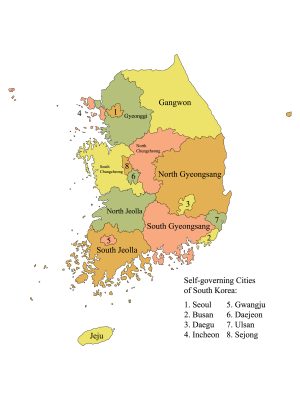The candidacy of Lee Jae-myung in South Korea’s 2022 presidential election brought international media attention to his record of providing youths with a basic income as governor of Gyeonggi Province. Policy observers are asking whether he might adopt a more expansive universal basic income policy if he were to win the Blue House in March.
However, the bigger story that these observers are missing is the leading role that local governments are playing in South Korea to experiment with creative solutions to societal challenges.
Technology and central government handicaps respectively act as the push and pull factors in this trend. The low barrier to entry that digital solutions promise in a widely-networked country provides local governments with the means to amplify their reach and address a wider range of issues. Meanwhile, the central government is often handicapped by competing objectives to pursue unorthodox measures. This leaves a vacuum that local governments can fill.
Three brief case studies underscore these new developments.
At the start of the pandemic, South Korea’s biggest food delivery application, Baedal Minjok, was accused of overcharging restaurant owners when it raised its commission for online orders to 5.8 percent. This led the Gyeonggi provincial government to co-finance a competing app called Delivery Express (or Baedal Teukgeup in Korean). The provincial government’s stated aim was to lower the cost of operations for small and medium enterprises as the country faced a sharp change in consumer behavior in response to the pandemic. The project was benchmarked on another app called Baedal Myeongsu, developed by the municipal government of Gunsan in response to similar complaints about high commissions charged by existing delivery apps.
While South Korea’s central government is adept at using a wide range of public resources to support businesses in emerging industries, introducing new enterprises in the market to compete against established companies would have been a step too far. National industrial policies often focus on building larger entities that could become competitive on the global stage. Moreover, the country’s focus on fostering the digital economy often sidelines the interests of smaller actors in the existing service industry. In this environment, the local government of Gyeonggi Province may have been better placed to pursue this unorthodox measure because it is less handicapped by the goal of building a globally competitive business and its relations with existing tech stakeholders.
The second case study comes from the Seoul Municipal Government’s response to reports that students from lower-income families have underperformed academically vis-a-vis peers with higher-income parents during the pandemic. To close this gap, the city government offered to provide private online tutoring to underprivileged students.
Similar to the case of the Gyeonggi provincial government’s delivery app, the Seoul Municipal Government is leveraging technology to respond to a problem that its denizens have raised. The central government would not have taken the lead in promoting this approach at a national level because it had long identified private tutoring itself as the root cause of any disparities in educational outcomes between children from families of different income groups. While it remains to be seen whether the Seoul Municipal Government’s approach will be successful in closing the gap in academic achievement between students of different socioeconomic classes, it is undoubtedly a novel approach that deserves close observation.
The final case study comes from the South Chungcheong provincial government, which is piloting artificial intelligence-based care robots to help communicate with local residents who are living alone and dealing with mental health problems. The aim is to address the growing number of people living with mental health issues and curb the suicide rate in South Korea, which remains the highest among member countries of the Organization for Economic Cooperation and Development (OECD). The need for additional mental health services is particularly high in South Chungcheong Province because the region suffers from the highest suicide rate in the country – 8 percent greater than the national average.
The central government is also investing resources to address this issue with the help of digital tools. However, provincial governments – which already maintain supplementary support and care facilities for vulnerable cohorts like the elderly – may be better placed to implement a targeted pilot program using their knowledge of local communities.
These and many other examples of local governments pursuing unorthodox policy responses to national challenges present the central government with opportunities to pick and choose the most effective public policies for potential nation-wide adoption.
However, there is also a limit to what these localized interventions can help address. Many issues that span across municipal and provincial lines cannot be addressed at a local level, no matter how innovative and entrepreneurial the policies might be. Examples that fall into this category include climate change and gender violence.
There is also the danger that nation-wide adoption of policies that merely address the symptoms of deeper issues may distract policymakers from exploring more foundational fixes. For instance, a prospective nationwide adoption of private online tutoring for children from lower-income families might marginally reduce the gap in educational attainment. However, this would not address the underlying problem of growing socioeconomic disparities.
There are some parallels here with developments in the United States. U.S. local governments have also been the testing ground for some of the more radical and unorthodox public policy measures in recent years – from Seattle’s adoption of a minimum wage that far exceeds the federal standard to Arizona’s decision to adopt a local tax on high-income earners to bolster education. While these municipal and state governments provide real case studies for potential public policy fixes, they need to be elevated and revised for federal adoption if pervasive social ills like systemic labor repression and tax inequality are to be fully addressed.
In this environment, how local experiments in South Korea are elevated to the national level will serve as a potential model for American advocates who hope to translate community successes into nationwide solutions.
































